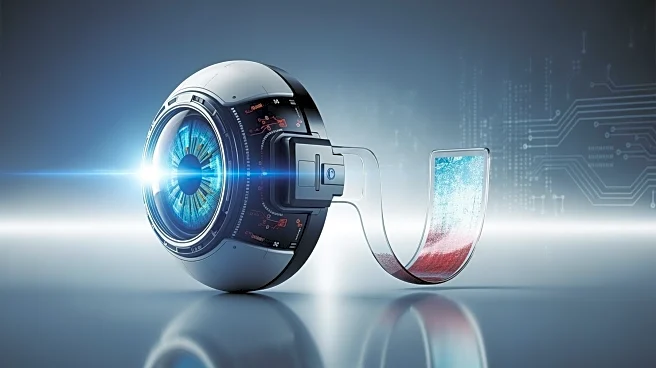What's Happening?
A groundbreaking development in medical technology has emerged with the creation of a bionic chip designed to help blind patients regain their sight. The i Paper reports that this innovative technology involves
a 2mm electronic eye implant, which has already shown promising results in clinical trials. One patient involved in the trial has expressed optimism, stating that the ability to read again has significantly improved her outlook on life. The technology is being hailed as a 'paradigm shift' by scientists, with potential plans for it to become available through the National Health Service (NHS) in the UK.
Why It's Important?
The introduction of this bionic chip represents a significant advancement in medical technology, particularly for individuals suffering from vision loss. If made widely available, it could dramatically improve the quality of life for many patients, offering them greater independence and the ability to engage more fully with the world around them. The potential availability of this technology through the NHS could also set a precedent for other countries to follow, potentially leading to broader access to such life-changing medical innovations. This development underscores the importance of continued investment in medical research and the potential for technology to address complex health challenges.
What's Next?
As the clinical trials continue to yield positive results, the next steps involve further testing and validation of the bionic chip's efficacy and safety. If successful, regulatory approval will be sought to make the technology available to a wider patient population. The NHS will likely play a crucial role in determining the accessibility and distribution of this technology, which could involve policy discussions and funding considerations. Stakeholders, including healthcare providers, patients, and advocacy groups, will be closely monitoring these developments, as the technology holds the promise of transforming the landscape of vision restoration.
Beyond the Headlines
The development of the bionic chip also raises important ethical and societal questions. As with any advanced medical technology, considerations around cost, accessibility, and potential disparities in access will need to be addressed. Additionally, the integration of such technology into everyday life may prompt discussions about the implications of human enhancement and the boundaries of medical intervention. These broader conversations will be essential in ensuring that the benefits of the technology are maximized while minimizing potential ethical concerns.











